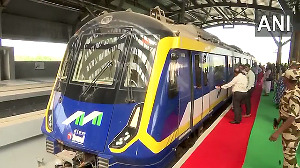Soon after I had taken over he summoned the minister, the secretary (a secretary is the senior-most bureaucrat at an Indian ministry) and me to a meeting. Not in his office in South Block, New Delhi and not in his office at Race Course road, but 30,000 feet above the earth in his special Air Force Boeing 737 on the way to Bagdogra, West Bengal from where he was continuing to Darjeeling and elsewhere to address some meetings. We were not the only ones who had meetings scheduled with him on the plane. There were other ministers and officials as well, all of us carrying every conceivable piece of paper we thought would be remotely useful during our exchanges.
We were shown into the prime minister's cabin in due course. Instead of asking us how Doordarshan was doing, or something similar, he began with, "Oh, here you are. I've been doing some thinking on what the organisation of Doordarshan should be. Here, take a look at this." And he pulled out some sheets of paper on which he had drawn a few organisational charts. One had as many as 11 additional DGs (director generals) under the DG (director general; Bhaskar Ghose himself). I suggested, hesitantly, that these were a few too many.
Rajiv responded instantly, almost eagerly. "No, not at all. You see, the problem as I see it is that the DG is inundated with a great deal of unnecessary work. Well, perhaps it isn't unnecessary, but it takes up a lot of his time. Now, these 11 chaps will do all of it and leave the DG free to think, to look at the whole network, and decide how best it could be improved."
Girish Mehra, the secretary, suggested that we take a little time and study the structure outlined and then come back to the prime minister with our suggestions. After some more discussion, Rajiv agreed, but before we were shown out he said, in his usual way, "Don't go to sleep on this."
When we came out, Mehra looked at me in astonishment. "Eleven additional DGs?" he asked. I told him the number did seem, to put it mildly, on the high side, but that I would work on it and try to preserve what Rajiv wanted -- freedom for the DG to study and think about major issues and policies -- without creating a vast bureaucratic empire.
I flew back to Delhi on a regular commercial flight and worked on the organisational plan Rajiv had sketched out. Eventually, after several attempts to define the specific nature of the work to be done, I was able to trim the proposed structure to three additional DGs, one deputy DG, a few more controllers of programmes and some corresponding increases in the engineering wing. I sent this off to the ministry, directly to the secretary, since he had been part of the discussions, and that was the last I saw of the plan. It may have gone to the prime minister with the minister's clearance, or perhaps it just sat on Ajit Panja's (the information and broadcasting minister) desk.
The next time I saw Rajiv it was later the same year, 1986, and it had to do with a fly.
The occasion was a live hook-up with leaders around the world, including (then







 © 2025
© 2025